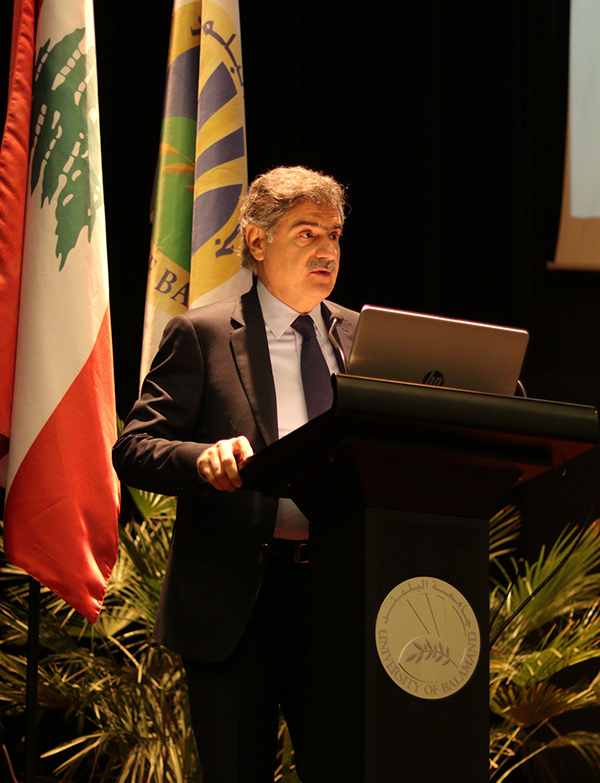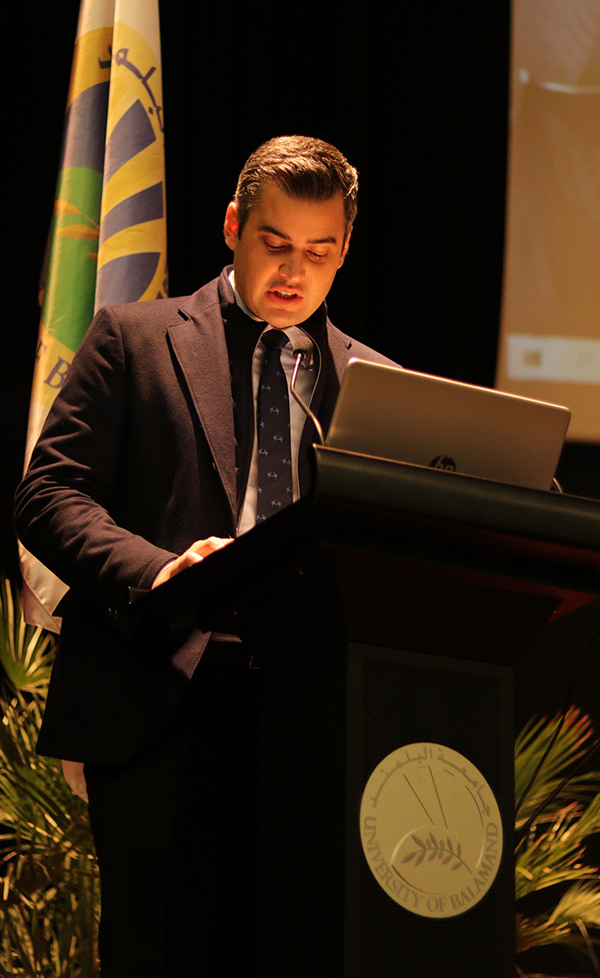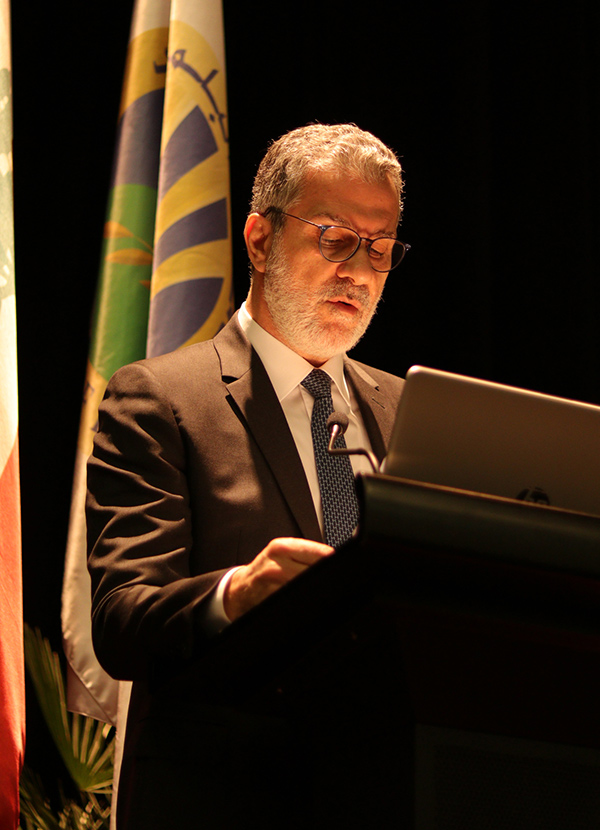Conference Hosted by the University of Balamand
Balamand, 16 February 2023: The University of Balamand, under the auspices of His Excellency the Caretaker Prime Minister, Mr. Najib Mikati, in collaboration with the Merhis Charity Association, the Transformation and Digital Governance Network in Lebanon, and the Arab Lebanese Council to orchestrate a symposium addressing the pressing matters of digital transformation strategies and good governance in Lebanon.
The conference took place on Thursday, February 16, 2023, at the University of Balamand’s main campus in Koura and was attended by H.E. the Minister of Tourism representing the Prime Minister, Mr. Walid Nassar, the Chairman of the Parliamentary Information Technology Committee, Representative Tony Franjieh, the Minister of Economy Representative and Head of the Consumer Protection Department at the Ministry of Economy, Ms. Lama Alameddine, the President of the University of Balamand, Dr. Elias Warrak, the General Coordinator of the Digital Transformation and Governance Network in Lebanon, Professor Nadim Mansouri, the Director of Public Relations at the Merhis Charity Association, Professor Wadi`a Al-Amyouni, in addition to many experts in the field of digital transformation. The conference was also attended by UOB Deans, faculty members, and students.
The conference highlighted the national strategies implemented as part of the digital transformation, emphasizing the significance of educational technology in academic institutions, as well as the knowledge economy and efficient business management in the digital era.
Professor Al-Amouni drew attention to the role of digital transformation in the fight against corruption. She explained that by placing technology at the heart of every political, social, and economic strategy, digital transformation can help create a more accountable and transparent system. She added, "Today, in this esteemed academic institution, we aim to raise awareness and formulate recommendations that encourage new ways of critical thinking that are free from corruption, nepotism, and destructive policies that harm the country."
In turn, Professor Mansouri made clear that the Digital Transformation and Governance Network is continuously working towards establishing a cooperative and participatory relationship with various Lebanese government bodies, including the Ministerial Digital Transformation Committee, the Technical Committee, and all specialized committees, in order to address the key issues that the network is focused on. He also expressed his pride in collaborating with the University of Balamand, stating: " The University of Balamand is an institution committed to human advancement and has a clear vision for the future. As a result, a memorandum of understanding has been signed between our two organizations, with the hope that this partnership will serve as a starting point for aligning the efforts of the academic and civil society sectors in implementing digital transformation strategies."
Dr. Warrak stressed on the critical need to incorporate the principles of governance and digital transformation into academic curricula, stating: “Our unwavering enthusiasm for this field stems from our belief that digital transformation is at the core of curriculum development, increased job opportunities, and global academic alignment, while propelling societal advancement”. President Warrak also added: " Following this path not only fosters practicality in daily governmental transactions but also highlights the need to eliminate bribery, unnecessary delays, and political interferences."
M.P. Franjieh brought forth his conviction regarding the indispensable role of the Parliamentary Information Technology Committee, stating: We must ensure that the technological advancement is transparently and accountably, in the best interests of citizens. We must also ensure that the policies we contrive are all-encompassing and easily accessible, taking into account the needs of each and every member of our society, regardless of their social and economic standing." Furthermore, he stressed the need for well-formed policies that govern technology in a manner that fosters good governance.
In Minister Nassar's intervention, he expounded on the Ministry of State for Administrative Reform’s attentive efforts, and highlighted the vital criteria necessary for implementing the national strategy for digital transformation. "This process relies on key factors such as data classification, digital access, platform interconnection, information security, and continuity of government business to ensure effective execution of the plan and application program," he said. He also noted that the primary goal of this strategy is to equip young entrepreneurs with essential digital skills to establish a modern and equitable state.
Moreover, Ms. Alameddine discussed the new economy and the fundamental characteristics that distinguish it from the traditional economy, as well as its potential to support the national economy, particularly in the unprecedented crisis that Lebanon is currently facing. She explained, "One of the most significant features of the knowledge economy is the continued integration of science and technology in all aspects of the economy and its crucial role in the production process.
This conference marked a pivotal collaborative initiative between institutions that are dedicated to digital transformation strategies and good governance, in line with the Memorandum of Understanding signed by the University of Balamand and the Network for Digital Transformation and Governance in Lebanon.
مؤتمر يتناول "استراتيجيّات التحوّل الرقمي والحوكمة الرشيدة في لبنان"
في جامعة البلمند
البلمند في 16 شباط 2023: نظّمت جامعة البلمند برعاية دولة رئيس مجلس
الوزراء الأستاذ نجيب ميقاتي وبالتعاون مع جمعية مرعي للأعمال الخيرية وشبكة
التحوّل والحوكمة الرقمية في لبنان والمجلس العربي اللبناني، مؤتمراً يتناول قضايا
"استراتيجيّات التحوّل الرقمي والحوكمة الرشيدة في لبنان" يوم الخميس 16
شباط 2023 في حرم جامعة البلمند في الكورة. وقد حضر المؤتمر ممثّل دولة رئيس مجلس
الوزراء وزير السياحة وليد نصّار، رئيس لجنة تكنولوجيا المعلومات النيابّية
النائب طوني فرنجيه، ممثّلة وزير الإقتصاد رئيسة مصلحة حماية المستهلك في وزارة
الإقتصاد الأستاذة لمى علم الدين، رئيس جامعة البلمند الدكتور الياس وراق، منسّق
عام شبكة التحوّل والحوكمة الرقمية في لبنان البروفسور نديم منصوري، مديرة العلاقات
العامة في جمعية مرعي للأعمال الخيرية البروفسورة وديعة الأميوني، عدد من الخبراء
في مجال التحوّل الرقمي والحوكمة الرشيدة، عمداء كليّات جامعة البلمند، عدد من
الأساتذة، الموظّفين والطلاب.
وقد سلّط
المؤتمر الضوء على أهمّ الإستراتيجيّات الوطنية المعتمدة ضمن إطار التحوّل الرقمي
كما وشدّد على أهميّة تكنولوجيا التربية في المؤسّسات التعليمية وأهميّة إقتصاد
المعرفة وإدارة الأعمال الذكية في عصر التكنولوجيا الرقمية.
وقد لفتت البروفسورة
الأميوني إلى دور التحوّل الرقمي في محاربة الهدر والفساد إذ انّه يضع التكنولوجيا
في صميم كل استراتيجية سياسية وإجتماعية وإقتصادية. وأضافت: "نحن اليوم في
هذا الصرح الأكاديمي العظيم نسعى لرفع مستوى الوعي ووضع توصيات لترسيخ تفكير نقدي
جديد، بعيدًا عن الفساد والمحسوبية والسياسات المدمرة للبلاد".
وبدوره أشار
البروفسور منصوري إلى سعي شبكة التحوّل والحوكمة الرقمية الدائم إلى بناء علاقة
تشاركية وتعاونية مع الحكومة اللبنانية ولجنة التحوّل الرقمي الوزارية واللجنة
الفنية وكافّة اللجان المختصّة، لتحقيق القضايا المركزية التي تعمل عليها الشبكة.
كما وعبّر عن فخره بالتعاون مع جامعة البلمند قائلاً: "إنّ جامعة البلمند
مؤسّسة تتوجّه لرقيّ الإنسان وتتمتّع برؤوية مستقبلية واضحة. وفي ضوء ذلك تمّ
توقيع مذكّرة تفاهم بين الطرفين آملين أن تكون هذه الشراكة مدخلاً لتوحيد الجهود
ما بين القطاعين الأكاديمي والمجتمع المدني المتخصص بتطبيق إستراتيجيات التحوّل
الرقمي".
في كلمته أكّد الدكتور وراق على ضرورة اللجوء
إلى مبدأ الحوكمة والتحوّل الرقمي في المناهج الأكاديمية مشدّدا: " إنّ
اهتمامنا بهذا المضمار إنّما ينبع من معرفتنا الأكيدة أنّ التحوّل الرقمي هو أساس
لتطوير المناهِج، زيادة فرص العمل، وملاقاة التوجّه الأكاديمي العالمي، إضافةً إلى
تطوير المجتمع". كما وأشار إلى الأثر الإيجابي الذي يتركه هذا المفهوم على
مختلف القطاعات قائلا: "إنّ الذهاب في هذا المنحى، يفضي ليس فقط إِلى مزيد من
العَمَلانية في الأمور الحياتية المتصّلة بالمعاملات الرسمية، وإنّما يريح المواطن
من عبء الرشوات، والمماطلة، وإضاعة الوقت، والإستغلال السياسي".
وقد شدّد
النائب فرنجيه على دور لجنة تكنولوجيا المعلومات البرلمانية
معلناً: "يجب أن نعمل على ضمان إستخدام التكنولوجيا بطريقة شفّافة وخاضعة
للمساءلة وبما يخدم مصالح مواطنينا كما يجب أن نتأكّد من أن السياسات التي نضعها
شاملة ويمكن الوصول إليها، مع مراعاة احتياجات جميع أفراد مجتمعنا، بغض النظر عن
وضعهم الإجتماعي والإقتصادي". كما وأشار إلى أهمية أن يكون إستخدام
التكنولوجيا محكوماً بسياسات واضحة وفعالة تعزّز الحكم الرشيد.
أما الوزير
نصّار فأكّد في مداخلته على جهود وزارة الدولة لشؤون التنمية الإدارية مصرّحًا:
"ترتكز عملية تطبيق الإستراتيجية الوطنية للتحوّل الرقمي على معايير حيوية
تسمح التنفيذ السليم للخطة والبرنامج التطبيقي وهي: تصنيف البيانات، تمكين الوصول
الرقمي، المنصة، الترابط البيني، أمن المعلومات، إستمرارية الأعمال الحكومية".
ولفت بدوره إلى هدف هذه الإستراتيجية إلى تزويد روّاد الأعمال الشباب بالقدرات
الرقمية الأساسية الضرورية لبناء دولة حديثة عادلة.
وقد تطرّقت الأستاذة
علم الدين إلى مفهوم الإقتصاد الجديد وخصائصه الأساسية التي تميّزه عن الإقتصاد
التقليدي وفوائده في دعم الإقتصاد الوطني وخاصّة في الأزمة غير المسبوقة التي يمرّ
بها لبنان. وقد أوضحت: "إنّ أهمّ الخصائص التي يتّسم بها اقتصاد المعرفة
يتمثّل في التوسّع المستمرّ في توظيف العلم والتكنولوجيا في جميع ميادين الإقتصاد
ودورها الحاسم في عملية الإنتاج".
وقد أتى هذا
المؤتمر كخطوة تعاونية أساسية بين المؤسسات المعنية باستراتيجيات التحوّل الرقمي
والحوكمة الرشيدة وعملاً بمذكرة التفاهم التي قد وُقّعت بين جامعة البلمند وشبكة التحوّل
والحوكمة الرقمية في لبنان.


